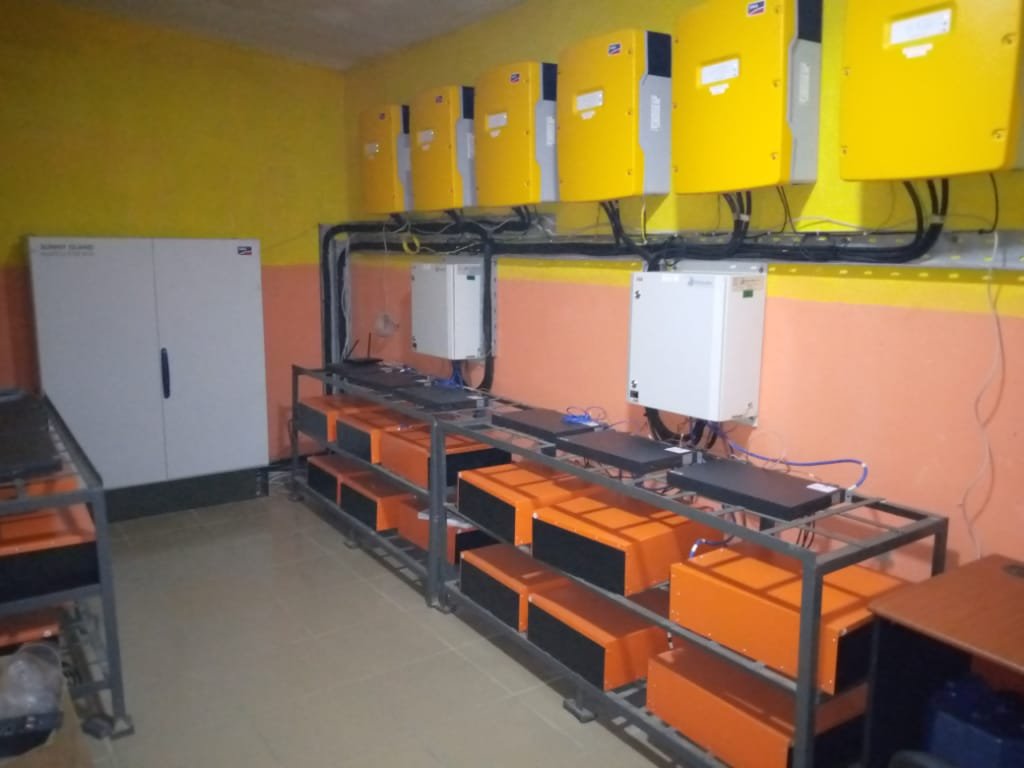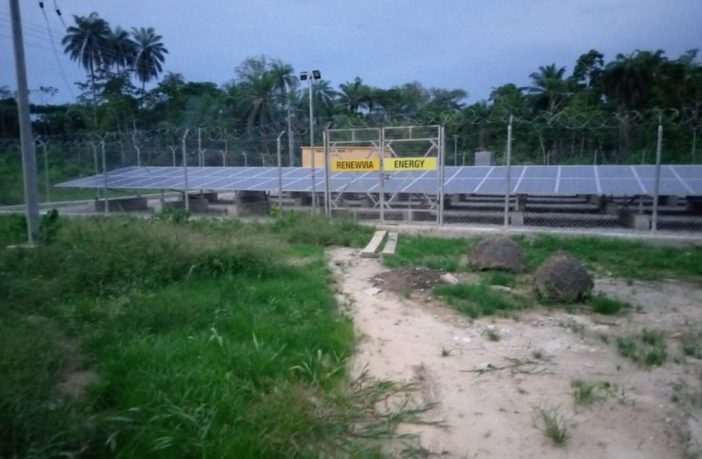- The Rural Electrification Agency (REA) has commissioned two solar hybrid mini-grids in the villages of Akipelai and Oloibiri, Bayelsa State, with a total capacity of 134.64kW for both communities under the Nigeria Electrification Project (NEP).
- These two hybrid mini-grid systems include 134.64kW of solar PV, 180kWh of lithium battery storage and two units of 100kVA diesel generator sets.
REA noted that solar hybrid mini-grids will provide clean, safe and reliable electricity to hundreds of people and spur economic growth in Akipelai and Oloibiri respectively.
Related news: Nigeria’s grant scheme to trigger mini-grid boom.
The NEP is a federal government programme that seeks to provide energy access to households and enterprises in off-grid communities across Nigeria through renewable power sources. The solar hybrid plants have been commissioned under the Performance-Based Grant (PBG) component of NEP.

Pic: Inverter and battery stack.Pic: Solar hybrid mini-grid in, Baysela State. Credit: Renewvia Energy Corporation.
Renewvia Energy Corporation, a recipient of the PBG from the REA through the World Bank funded NEP, has successfully developed two solar hybrid mini-grids in Bayelsa state.
These mini-grids utilise lithium-ion battery storage to provide reliable power throughout non-daylight hours and are designed to scale as individual household and communal power demand increases.
REA’s CEO & MD, Ahmad Salihijo Ahmad commented: “The REA is committed to scaling up reliable and sustainable energy access to rural unserved and underserved communities through the provision of grants to mini-grid developers, which is the intent of the federal government through the NEP.
“After signing two Performance-Based Grant agreements with Renewvia Energy, we are delighted to see the completion of these two projects and we look forward to commissioning more sustainable electrification solutions in our rural communities by grant beneficiaries.”
Solar hybrid mini-grids
The 67.32kW solar hybrid mini-grids in Akipelai and Oloibiri are estimated to connect 364 households. In the course of developing the infrastructure, the project created 170 jobs in the construction phase and seven permanent jobs.
The World Bank Task Team Lead, Jon Exel stated, “The solar hybrid mini-grids in Akipelai and Oloibiri will boost the local economy and improve the quality of life in both communities through electrification of homes, schools, and businesses. Through NEP, reliable electricity will be provided to unserved and underserved households, Micro, Small and Medium Enterprises (MSMEs), and universities and teaching hospitals in Nigeria.
“The project’s mini-grid component, specifically, aims to develop solar hybrid mini-grids to serve 300,000 households and 30,000 MSMEs with clean, safe, affordable and reliable electricity. Together, the World Bank and the federal government of Nigeria are determined to transform the power sector with the goal of increasing electricity access for all Nigerians.”
Renewvia Energy CEO, Trey Jarrard stated, “Renewvia Energy is pleased to help fulfil the bold ambitions of the Nigeria Electrification Project, an important effort to bring clean, safe and affordable energy to communities in the Nigeria that need it most. We are proud of Renewvia’s state-of-the-art microgrids, which have the ability to scale with the needs of each of these villages, and we look forward to expanding our work in Nigeria in the near future.
Author: Babalwa Bungane
Babalwa Bungane is a content creator/editor for ESI Africa – Clarion Events Africa. Babalwa has been writing for the publication for five years. She has a great interest in social media due to its advantage of disseminating content.
This article was originally published on ESI Africa and is republished with permission with minor editorial changes.















